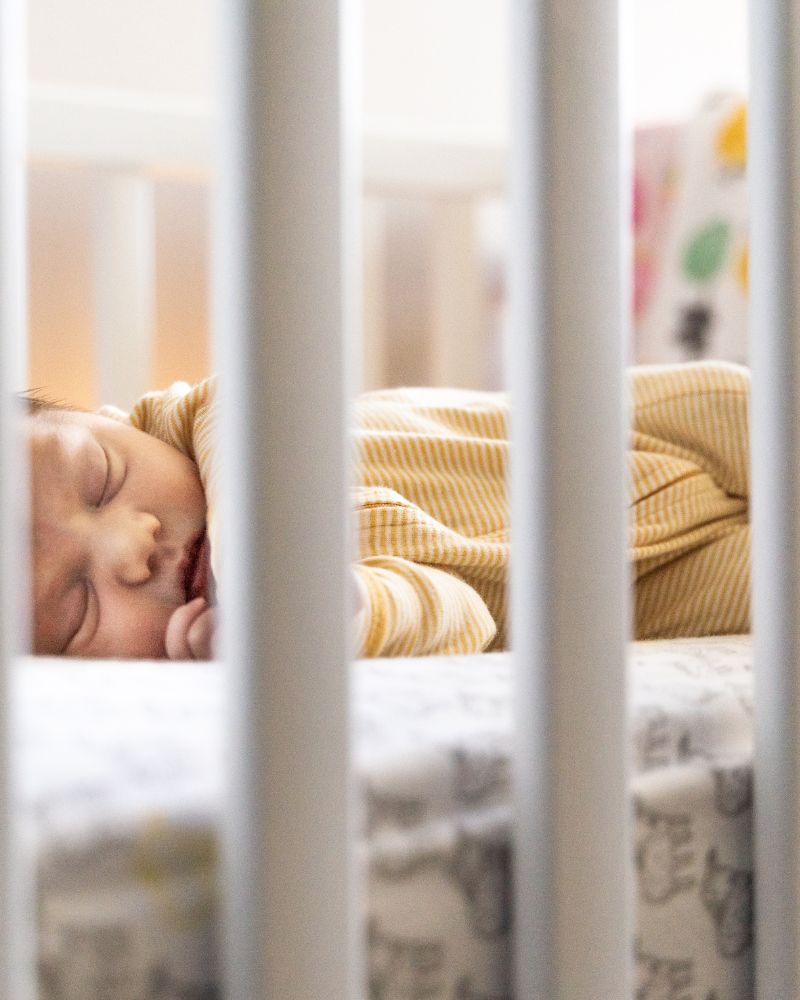When I was a new mom, I thought sleep training was a rite of passage. I even attempted sleep training with my first child, but it felt so wrong, and she just cried and cried with no end in sight. Eventually, I realized that I just couldn’t continue to sleep train her because what I was reading on the internet about sleep training and how babies should respond did not seem to apply to my baby. Since then, I’ve learned a ton about infant and child sleep, and I confidently choose to not sleep train my children, and I’m sharing the five biggest reasons why.

1. Sleep doesn’t need to be “taught” or “trained”.
Sleep is a biological function, much like the biological function of elimination. Babies are born knowing how to sleep- they sleep just fine in the womb! We don’t have to teach our children how to sleep any more than we need to teach them how to pee or poop. Our job is to support their sleep, help them do what they cannot yet do for themselves, and foster a calm and safe sleep environment so they are comfortable enough to sleep when they are ready for it.
So what does non-responsive sleep training actually train, if not sleep? Simply put, non-responsive sleep training is a behaviorist intervention designed to stop an unwanted behavior, in this case signalling or crying for a parent. When we don’t respond to our child, or when we gradually take longer and longer to respond to them, we are teaching them that their signals are ineffective. This is why they eventually stop signaling- not because they have learned to sleep.
2. Babies are wired to be responded to.
We know from a solid foundation of developmental and attachment research as well as neuroscience that babies are designed to signal to a caregiver, and they expect and anticipate a response in return. This exchange of communication and responsiveness is exactly what our babies need to thrive. It helps them form brain connections that teaches them their caregivers are responsive, their needs will be met, and they are safe. It also teaches them about the world and relationships. It’s incredibly powerful! So, we have to wonder about the potential negative consequences of intentionally doing something that we know is the opposite of what our babies need to thrive.
3. Children’s needs don’t stop at night.
It is normal for children to have needs at all hours of the day and night. This is understandably inconvenient and difficult for parents. We need our sleep, of course! (Check out this free webinar about how mothers can improve their own sleep without sacrificing responsiveness to their children.)
Children’s cries are a form of communication; they are telling us something, and they have an unmet need. The need could be that they are wet and need a diaper change, hunger, or just a need for comfort and closeness to us. All of those needs are valid, and teaching a baby not to signal to us at night does not stop the needs. It just teaches them we won’t respond and intervene to make sure their need is met. Personally, I want to teach my child that I will be there for them at all hours of the day and night.
4. It is biologically normal and developmentally appropriate for babies and young children to wake at night.
Babies are designed to wake at night. Babies’ sleep cycles are shorter in length than the sleep cycles of children and adults, and they also spend more time in active stages of sleep, meaning they are more wakeful. This serves multiple purposes- it is protective and helps prevent babies from entering into too deep of sleep before they are ready. Breastmilk is digested quickly, and babies often need to feed throughout the night. In active stages of sleep, a large amount of brain growth is happening, which is ideal for infants.
With non-responsive sleep training, the end goal is to eliminate signals and get baby sleeping independent through the night. But, babies aren’t designed for independent, deep sleep. They are designed for supported, active sleep with frequent wakes to feed, ideally in the proximity of their mother. Again, we have to consider the unintentional consequences of intervening in a way that causes baby to sleep more deeply than they are designed for.
5. Sleep training doesn’t get to the root of sleep issues.
Most babies are sleeping quite normally and appropriately, but sometimes babies do have disrupted sleep for a variety of reasons. Sleep training acts as a bandaid; it does not address the root cause of why babies are not sleeping! Non-responsive sleep training assumes that babies aren’t sleeping optimally because a parent/caregiver is responding to their cries and supporting them with sleep. This could not be further from the truth. Parents are responding to babies’ signals because of a need. Many factors play a role in how well a baby is waking at night, how often they are feeding, and how much support they need. It is not the fault of parents that babies have needs, and parents are doing exactly what they should be doing by responding to them. If a baby is waking excessively, instead of sleep training, parents should be supported in exploring the underlying root cause of the sleep disturbance. Some examples of root causes to sleep challenges include: feeding challenges, medical and airway issues, scheduling issues, sleep environment, and more! Sleep training doesn’t address any of these underlying issues.
In fact, sleep training doesn’t appear to actually improve a baby’s sleep at all. When objective actigraphy is used to measure sleep, research shows that sleep trained babies don’t sleep significantly more than non sleep trained babies.
If you want to learn more about respectful sleep solutions to improve sleep for the entire family, make sure you snag this free guide. Want to dig deeper? The comprehensive Infant Sleep Foundations eCourse will help you gain a deeper understanding your child’s needs and why they are sleeping the way they do. It will also help you get to the root cause of your child’s sleep challenges and address them in a way that is responsive, respectful, and feels good.


